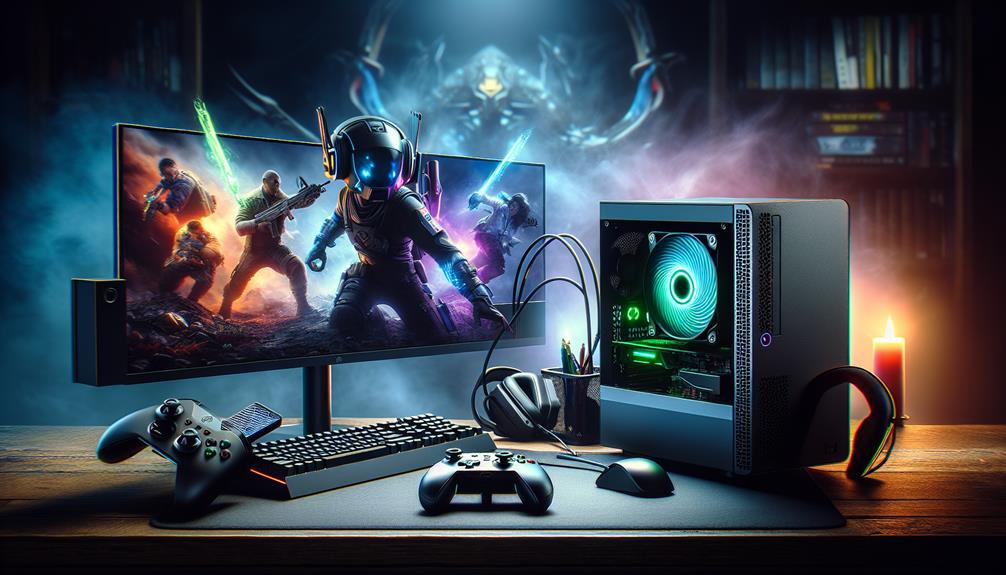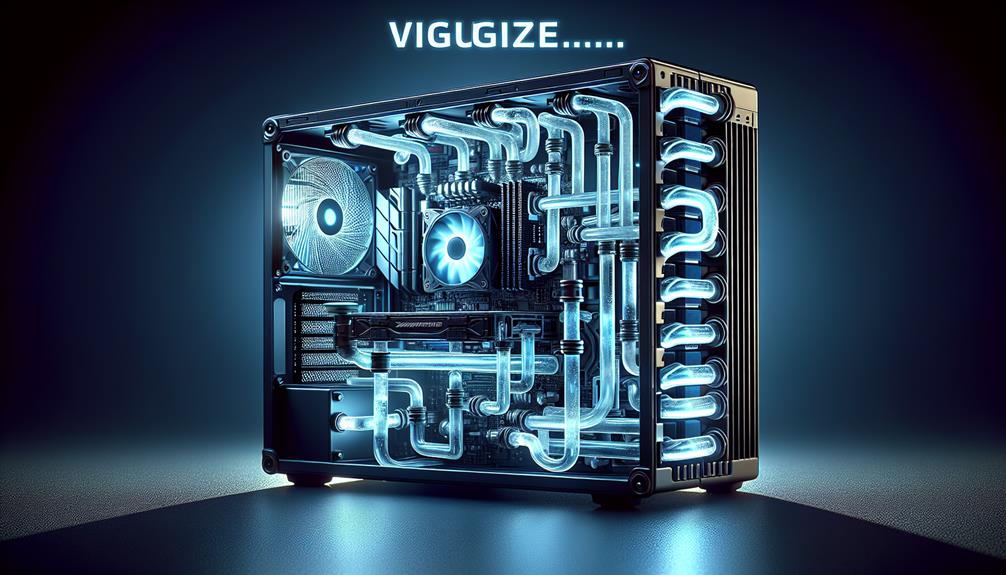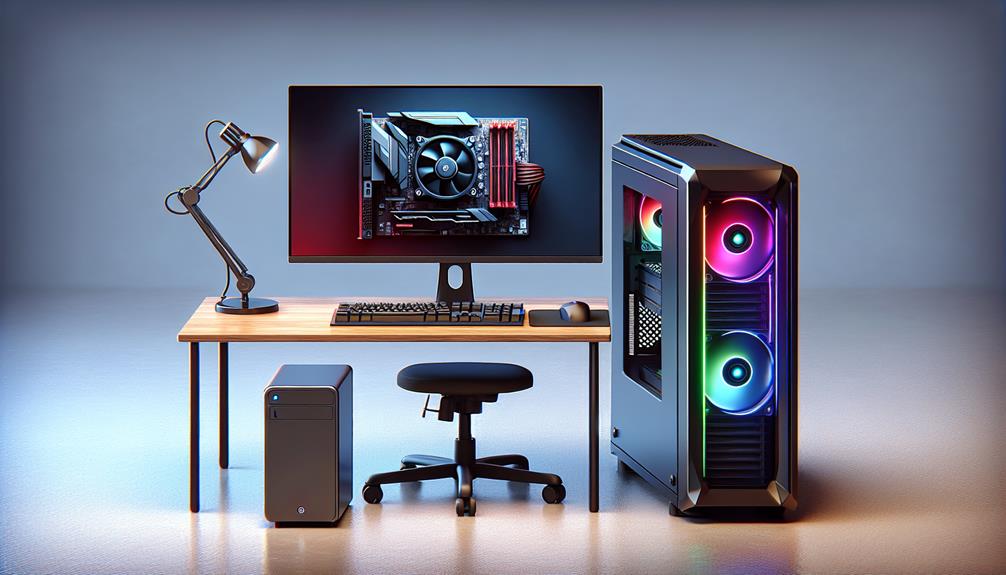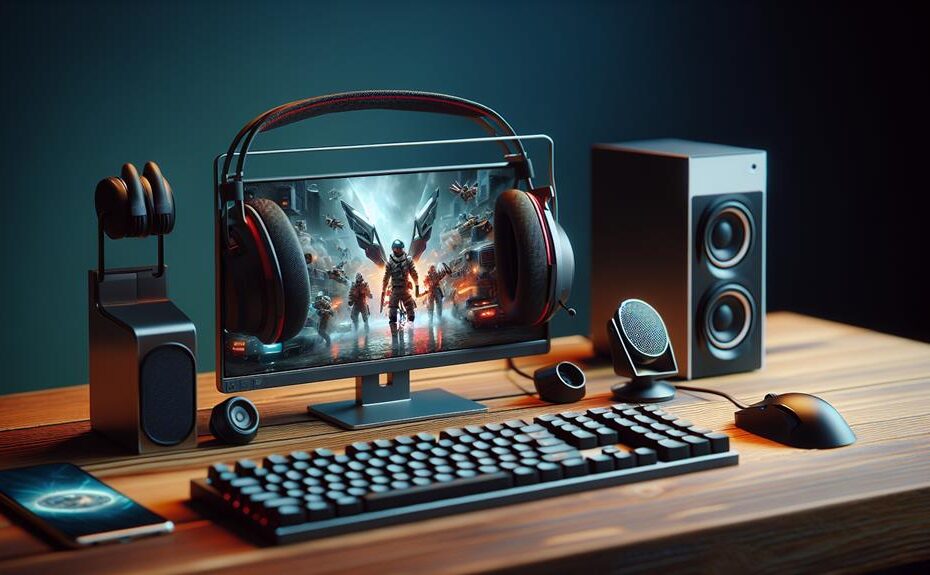



Yes, a Mini PC can be used for gaming. It offers compactness, portability, and impressive performance potential. Mini PCs are ideal for limited spaces and lower power consumption. Modern Mini PCs deliver good gaming performance and can be upgraded for enhanced experience. Checking game compatibility, frame rates, and graphic settings is important. Understanding cooling and connectivity options is essential. While Mini PCs are budget-friendly, gaming PCs offer a superior gaming experience. Consider the hardware requirements, upgradability, and cost factors when choosing between a Mini PC and a traditional gaming setup.
Key Takeaways
- Modern Mini PCs can deliver impressive gaming performance with compact size.
- Gaming performance depends on graphics cards and processor speed.
- Check game compatibility and adjust graphic settings for optimal performance.
- Some Mini PCs allow for component upgrades to enhance gaming experience.
- Efficient cooling and proper thermal management are crucial for peak gaming performance.
Mini PC Vs. Traditional Gaming Setup
When comparing a Mini PC to a traditional gaming setup, the key differences lie in their size, portability, and performance capabilities. Size-wise, Mini PCs are notably smaller and more compact than traditional gaming setups. This makes them ideal for users with limited space or those who prefer a more minimalist gaming station. The reduced size also contributes to better portability, allowing you to easily move your gaming rig from one room to another or even take it with you when traveling.
Moreover, Mini PCs tend to have lower power consumption compared to traditional gaming setups. This is advantageous not only for reducing electricity bills but also for minimizing heat generation, which can help maintain a cooler and quieter gaming environment. Despite their smaller size and lower power consumption, modern Mini PCs can still deliver impressive gaming performance, especially for casual gamers or those who prioritize convenience and space-saving benefits.
Hardware Requirements for Gaming
To ensure peak gaming performance, it is vital to meet the specific hardware requirements mandated by the games you plan to play. Two key components that heavily impact gaming performance are graphics cards and processor speed. Graphics cards, like NVIDIA GeForce or AMD Radeon, play a vital role in rendering high-quality visuals and guaranteeing smooth gameplay. Different games may have varying demands on graphics cards, so it's important to check the recommended specifications for each game.
Processor speed, measured in gigahertz (GHz), determines how quickly your computer can process game data. A faster processor speed results in smoother gameplay, quicker loading times, and a better overall gaming experience. Games with advanced graphics and AI capabilities often require higher processor speeds to run optimally.
Before investing in a mini PC for gaming, make sure that the graphics card and processor speed meet the minimum requirements of the games you intend to play. Upgrading these components can enhance your gaming experience and prevent performance issues.
Gaming Performance of Mini PCs

Maximizing gaming performance on mini PCs requires a careful consideration of key hardware components and system specifications. When evaluating a mini PC for gaming, it's critical to look at performance benchmarks to understand how well it can handle different games. These benchmarks give insights into the mini PC's capabilities across various titles and graphic settings. Game compatibility is another vital factor to assess; make sure that the mini PC can run the games you want to play smoothly.
Frame rates play a significant role in gaming performance. Mini PCs vary in their ability to deliver high frame rates, impacting the overall gaming experience. Lower frame rates can result in choppy gameplay and lag, while higher frame rates provide smoother visuals. Hence, it's important to check the mini PC's ability to maintain stable frame rates in the games you enjoy.
Upgradability and Expansion Options
For top performance and future-proofing your gaming setup, examining the upgradability and expansion options of a mini PC is important. When considering a mini PC for gaming, it's essential to assess the upgrade options and limitations it offers. Some mini PCs may allow for upgrading components like RAM, storage, or even the graphics card, while others may have limited upgradability due to their compact size and specialized components. Understanding these constraints is necessary to make certain your gaming rig can evolve with your needs over time.
Additionally, evaluating the expansion ports and compatibility of a mini PC is crucial. Expansion ports such as USB, HDMI, DisplayPort, and Thunderbolt can enhance connectivity and support additional peripherals like monitors, external storage, or VR headsets. Checking the compatibility of these ports with your existing gaming accessories is important to avoid any connectivity issues or the need for additional adapters.
Cooling and Thermal Management

Efficient cooling and effective thermal management play an essential role in maintaining peak performance and prolonging the lifespan of a mini PC used for gaming. Mini PCs, due to their compact size and powerful components, generate a significant amount of heat during intense gaming sessions. Proper heat dissipation is vital to prevent overheating, which can lead to performance throttling or even hardware damage.
To tackle this issue, mini PCs often utilize advanced cooling systems, which typically consist of heat sinks, heat pipes, and fans. The fans are vital for expelling hot air from the system and bringing in cooler air to dissipate the heat generated by the components. However, a common concern with these cooling solutions is fan noise. The high RPM of the fans required to dissipate heat efficiently can result in noticeable noise levels, which may be a drawback for some users.
Therefore, when considering a mini PC for gaming, it's important to assess the cooling system's effectiveness in managing heat dissipation while also taking into account the potential impact of fan noise on your gaming experience.
Connectivity and Peripheral Support
Taking into account the demands of gaming and the necessity for seamless integration with various devices, the connectivity options and peripheral support of a mini PC become vital factors to evaluate. Mini PCs often come equipped with a variety of ports such as USB, HDMI, DisplayPort, and audio jacks to support different peripherals like gaming controllers, keyboards, and mice. It's important to make sure that the mini PC you choose has the necessary ports to connect your gaming accessories without the need for additional adapters.
Peripheral compatibility is essential when considering a mini PC for gaming. Make sure that the mini PC supports the peripherals you intend to use, especially if you have specific gaming accessories that are essential for your gaming experience. Additionally, look for mini PCs that offer wireless gaming capabilities to reduce cable clutter and provide more flexibility in setting up your gaming station. This feature allows you to connect wireless peripherals like gaming controllers and headsets effortlessly, enhancing your overall gaming experience.
Cost Comparison: Mini PC Vs. Gaming PC

When comparing the costs between a mini PC and a gaming PC, it's important to assess the value each option offers regarding performance and affordability. Mini PCs are generally more budget-friendly than gaming PCs due to their smaller size and lower hardware specifications. However, this cost-saving measure can impact the gaming experience. Gaming PCs, while pricier, are designed to handle high-demand games with ease, offering better graphics, faster processing speeds, and smoother gameplay.
Performance comparison is essential when deciding between a mini PC and a gaming PC. Gaming PCs are equipped with powerful processors, dedicated graphics cards, and ample RAM, providing a superior gaming experience compared to mini PCs, which may struggle with running demanding games at high settings.
Size and portability are where mini PCs shine. Their compact design makes them easy to move around and fit into small spaces, ideal for gamers with limited room or those who travel frequently. Gaming PCs, on the other hand, are bulkier and less portable, requiring a dedicated space for setup.
Disclosure: As an Amazon Associate, I earn from qualifying purchases.





